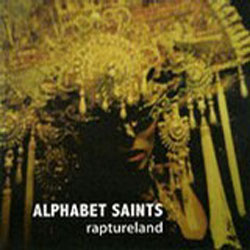Trying to write about the music of a great music journalist is as tricky as finding a point outside the world to view it from. No one could describe Raptureland better than its creator, Chris Roberts, and its nearly as difficult to think of anyone else who could have made it. There are precedents, Catwalk and Scalaland, Roberts’ former incarnations, but it is with Alphabet Saints (instrumentalist Hamilton Lee, ex Furniture and Transglobal Underground makes up the other half) that Roberts nails down the record I suspect he’s been wanting to make for a couple of decades.
Any reader turned onto the artists Roberts has spent his career enthusing about will have a fair idea what to suspect from this but there are surprises, not least musically. Maybe it is something to do with duos, but there are echoes of My Computer’s largely forgotten Vulnerabilia; Raptureland is less meandering and more focused than that – think of Tindersticks going electronic – yet there’s a similar drift and lack of rigid definition. Opening track ‘European Girl’ even has a Caledonian synth/bagpipe on it (I think), and though it carries a beautiful melody, lacks the tightness of perfect pop, Roberts leaning towards his Avant Garde side here and elsewhere. There’s a pleasant tension between his soft voice, which holds something back for itself, and a casual delivery that runs over the album. This lightness allows the lyrics, often decorative and precious, to flow and not jar, avoiding the most obvious pitfall of one used to words without a musical accompaniment.
New Running Order by Alphabet SaintsHe is assisted by Lucy Castro, a Yorkshire Mary Margaret O’Hara who lashes her vocals to his, bringing a subtle force to the songs, the result often sounding like the upper and lower register of the same voice. This matters as Roberts hasn’t the pipes for anthemic belters, a female counterpart making a virtue of his reclining delivery.
As there are no big summer choruses here, it’s difficult to imagine Raptureland being the soundtrack to many festivals, or even how it could work live – which is probably the point. This is indoors music touched by something of the night. When the album loses its nocturnal atmosphere (Ferry replacing Almond in a post rave Soft Cell) things turn autumnal, with ‘My Last Desire’ reminiscent of Yello’s gorgeous ‘Of Course I’m Lying’. Like much of the album it feels like the middle of a longer song that ended before, and began after, the one we hear. In places Robert’s spoken word parts have a touch of Bowie’s ‘Halloween Jack’, or a slightly more cheerful version of the serial killer in Outside, particularly on the end of the world narrative ‘Love Or Nothing’. Usually, though, there is no ‘story’ at all – just an overheard discussion set to music, oblique and discursive as with the Dexy’s of Don’t Stand Me Down.
I don’t know if this will be the record that gives Roberts a leg up to the Chrissie Hynde/Bob Stanley milieu of journalists who have successfully moved into pop stardom. It may not be direct or straightforward enough for that purpose. It would be a pity if it didn’t, because Roberts’ musical cross-referencing is deliberate and not a game of spot the influence. Perhaps it is unapologetic narcissism, or just instinct, but the critic in him is still at work. Raptureland is the sound of a man awash in his own aesthetic adding to a distinguished record collection he already owns – and for the rest of us, a short cut to those same giddy heights.
Tariq Goddard’s new novel The Message is released by Zer0 Books this September


